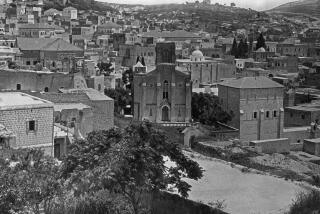Afghan Woman’s Tale Rises From Bottomless Well of Sadness
- Share via
She steps through a shaft of morning light on a quiet side street in Pasadena, her shadow trailing, and turns in to a small cafe. She is slight, attractive, and nothing about her gives away the story she has come to tell.
Tahmeena Faryal takes a seat, and maybe now there is a clue. Something gathers in her eyes, dark and intense and far off. Whatever it is, she seems distracted by it, if not troubled, and virtually unaware of me.
Have you heard the latest? I ask. The Northern Alliance has taken Kabul.
She sags, her spirit caving, then gives me her attention for the first time.
“That is very bad news,” she says, her eyes bottomless wells. “In some ways, they are worse than the Taliban.”
Faryal, who grew up in Afghanistan and lives now in Pakistan, is a soldier of sorts. She is being shuttled about California, somewhat secretively, because of her mission.
She is a member of the Revolutionary Assn. of the Women of Afghanistan, RAWA, which has spent years bringing the oppression of their sisters to the world’s attention, often at great personal risk.
Faryal--an alias she uses for her own protection--begins to speak now in a broad, detached way about the history of Afghanistan’s destruction. But I direct her down another path. I’d like to hear her personal story.
She hesitates at first, maybe out of deference to those who have suffered for years. But then she obliges.
Her family fled Afghanistan when the Soviets came in, escaping threats on their lives and settling in Pakistan. She was 10 at the time, and went back roughly a decade later on a covert mission for RAWA, in 1999, to see what had become of her homeland.
How did you get in? I ask.
“Under the burka,” she says, referring to the veil.
If she had been found out, she could have been jailed, beaten or worse.
But she had to go.
“This is all I want to do,” she says. “To give voice to the women and children of Afghanistan.”
It was very warm when she made her journey, and she was suffocating under the veil. Women, who under the Taliban can’t hold jobs or leave the house without a male escort, must always wear that veil in public. To remove it, even for a moment, is to invite a beating.
When Faryal pulled it on for the first time, she reeled at her own disappearance, and wept tears no one could see.
“I had that feeling for a few days, and cried many times,” she says. “At first I barely could see, and it was difficult to breathe. It was taking me days just to be able to walk.”
From beneath her veil, the city she had known was unrecognizable, destroyed by years of war.
Women who had been doctors, engineers and lawyers begged on the streets. Thousands were widows, their husbands lost in war or executed for challenges--real or perceived--to Taliban rule. Some of those widows had turned to prostitution to feed their children.
None of this was a surprise to Faryal, who had seen secretly recorded photographs and videos. She had also met with thousands of refugees to whom RAWA has given aid and comfort. Still, she was devastated.
“Nothing could have prepared me. There were many moments when I wanted to scream, but I knew what would happen if I did. I wanted to scream and scream and scream; go to the top of a mountain and tell the world.
“I was terrified at many times, but not for myself. I was terrified by what had happened to my country. Once, in a crowded market, I lifted up my burka because I couldn’t breathe. I thought there were no Taliban around, but a woman whispered to me that they were coming from another direction.”
They didn’t catch her committing the high crime of taking an unencumbered breath, but she saw another woman beaten with a lash for the same offense. The beatings are carried out by a Taliban squad that is called--without a trace of irony--the Virtue and Vice police.
Faryal saw women take off their veils behind closed doors and sit crying or trembling. She saw one laughing hysterically one minute, crying the next.
“They are like shadows,” she says.
She did not meet a single woman who complained of physical beatings. They complained instead about the insult of their daily lives, and the theft of their identities.
Faryal would like to be optimistic about the routing of the Taliban from Kabul, but she isn’t. The problem isn’t just the Taliban, she insists, but all Islamic fundamentalists who corrupt the Koran and annihilate women, and they must all be driven out.
She fears the United States has legitimized the Northern Alliance, despite its own history of crimes against women, including abduction and rape.
I wait on her next words, but none are forthcoming. She has retreated again, to Afghanistan, dark eyes burning.
*
To find out more about Faryal’s cause, check www.rawa.org. Steve Lopez writes Monday, Wednesday and Friday. He can be reached at [email protected]
More to Read
Sign up for Essential California
The most important California stories and recommendations in your inbox every morning.
You may occasionally receive promotional content from the Los Angeles Times.











